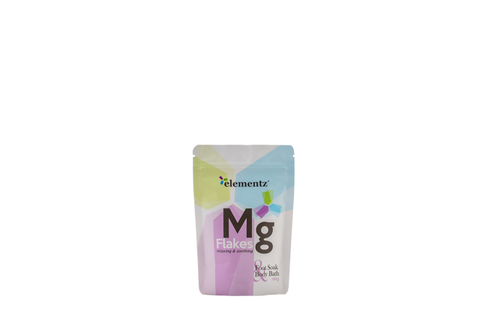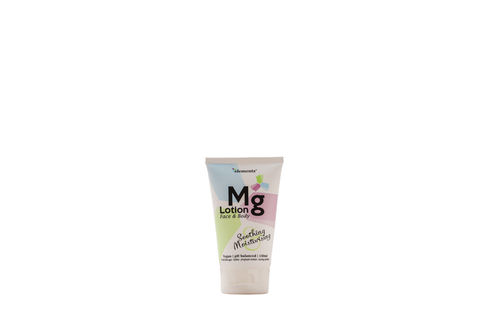Did you know that magnesium can help with a variety of pregnancy symptoms? Morning sickness, anxiety, ligament pain, muscle discomfort, headaches, back pain, and sleeplessness are just a few examples.
Magnesium is a mineral that is essential for human body function and is involved in over 700 processes. We would not be able to produce energy, metabolize insulin, or move our muscles adequately without it. Because magnesium requirements increase during pregnancy, your body would require a higher intake.[1]
During pregnancy, magnesium is crucial for the body's ability to adjust to the changes brought on by a growing baby, and lack (or to be more precise, insufficiency) of the mineral may be to blame for the severity of some common pregnant symptoms.’’Therefore it comes as no surprise that magnesium is an important part of the whole miracle of ushering new life into the world’’ Carolyn Dean, M.D., N.D.[2]
This article will cover the following :
Is magnesium safe for pregnant women?
Why is magnesium needed?
Benefits of magnesium for labor and the unborn child.
The types of topical magnesium which can be used.
Magnesium baths (or foot soaks)
Topical vs oral magnesium for pregnant women.
How much magnesium is required.
Summary
Sources
Is magnesium safe for pregnant women?
Many soon-to-be mothers question whether magnesium is safe to consume during pregnancy. The good news is that no research indicates magnesium can harm you or your unborn child. In fact, it’s a necessity! [3]
Several studies have investigated the safety and effectiveness of magnesium during pregnancy. A study published in the Journal of Obstetrics and Gynaecology Research[4] found that magnesium supplementation during pregnancy was associated with a lower risk of low birth weight, preterm birth, and the need for neonatal intensive care.
How much magnesium is required?
During pregnancy, you need more magnesium than usual. Here are the details:
Pregnant women 18 and under: 400 milligrams (mg) per day
Pregnant women ages 19 to 30: 350 mg per day
Pregnant women ages 31 to 50: 360 mg per day
Breastfeeding women 18 and under: 360 mg per day
Breastfeeding women ages 19 to 30: 310 mg per day
Breastfeeding women ages 31 to 50: 320 mg per day [5]
Benefits of magnesium for labor and the unborn baby
During pregnancy, magnesium is even more important as it supports fetal development and can help prevent pregnancy complications. But did you know that magnesium can also benefit labor and the unborn child? Here are some ways that magnesium can be beneficial during labor and for the unborn child.
Magnesium can help prevent preterm labor.
A study published in the Journal of Obstetrics and Gynecology found that magnesium sulfate can significantly reduce the risk of preterm birth as it works by relaxing the uterus and preventing contractions, which can help delay the delivery.
Helps with pain relief during labor.
Magnesium can also be used as a pain relief method during labor. Magnesium has been shown to have analgesic properties, meaning that it can help reduce pain. One of the primary benefits of magnesium during labor is its ability to relax the muscles which makes the process smoother overall.
Supports fetal development.
Magnesium is absolutely essential for fetal development, especially for the development of the nervous system and helps your baby build strong teeth and bones! Adequate intake of magnesium during pregnancy has been associated with lower risks of birth defects and a healthier birth weight for the baby.
Topical vs oral magnesium for pregnant women
“Like many nutrients, the need for magnesium increases during pregnancy and many women may not be eating this increased need from diet alone.” says Sarah Schlichter MPH, RDN. [3] Ways to increase magnesium levels would be by taking magnesium supplements transdermally or oral magnesium supplements.
Transdermal supplementation entails applying magnesium oil, lotion or gel directly to the skin, typically in the area where you're seeking relief. Additionally magnesium foot soaks or baths are another effective means of transdermal magnesium supplementation.
For example, if you have restless legs, you would massage magnesium lotion onto your leg muscles. Or if you have sore hips, massage the lotion into them.
Oral magnesium supplementation is what springs to mind for most people. This generally involves ingesting capsules or tablets.
By applying magnesium directly to your skin, you can help soothe the affected area almost instantaneously.
The main reason transdermal magnesium is superior to oral supplementation is because magnesium is poorly absorbed by the body through the gut. Magnesium supplements can increase the likelihood of stomach pains and diarrhea because the body is unable to break them down and use them effectively.[7]
Topical supplementation has higher absorption rates without unpleasant side effects. Furthermore, high-quality topical magnesium products are moisturizing for the skin.
The types of topical magnesium which can be used
One way to use magnesium during pregnancy is through topical products. But which types of topical magnesium are safe to use during pregnancy? Here are some options:
Magnesium oil
Magnesium oil can be applied directly to the skin, where it is quickly absorbed. It is a concentrated solution of magnesium chloride and water. A study published in the Journal of Integrative Medicine found that magnesium oil can increase magnesium levels in the body without causing any adverse effects.
Magnesium lotion
Magnesium lotion is a hydrating and replenishing lotion that contains magnesium chloride. It can be applied to the skin where it is absorbed slowly over time. Pregnant women may prefer the option of magnesium lotion if they have sensitive skin or do not like the texture of magnesium oil.
Magnesium gel
Magnesium gel often has higher concentrations of magnesium than magnesium lotion. When chilled it can be more soothing on the skin, addiing the relief through its cool temperature..
Magnesium flakes
Magnesium flakes is another great way to get the magnesium. It is dissolved in warm water and can be absorbed through the skin to help increase magnesium levels in the body. A study published in the journal Nutrients found that taking magnesium flakes baths can be an effective way to increase magnesium levels in pregnant women. Soak in a magnesium flakes bath for 15-30 minutes, or up to 1 hour. Magnesium baths are the ultimate relaxation tool during pregnancy which cansimply be prepared at home. If a bath tub is not accessible, a simple foot soak is the next best thing!
Magnesium baths are the ultimate relaxation tool during pregnancy which cansimply be prepared at home. If a bath tub is not accessible, a simple foot soak is the next best thing!
Magnesium baths (or foot soaks)
A warm bath is not only safe for expectant women, but also very soothing. In fact, many physicians recommend warm baths not only to relieve sore and achy muscles, but also to alleviate sciatica pain, edema swelling, and haemorrhoid pain in women.By adding magnesium, it introduces a great benefit as it plays an essential role in the stages of pregnancy and the early life of the baby.[8]. Baths or foot soaks should be warm -not hot- and ideally with the water temperature at 37c.
Why is Magnesium needed?
“Magnesium during pregnancy is important for almost every system in your body – and your baby's body”. Said by Eva Dasher, Medically reviewed by Erin Hinga, M.S., R.D. [2] This mineral is essential for nerve and muscle function and aids in maintaining normal blood pressure. It also helps your child develop healthy teeth and bones.
Additionally, research indicates that sufficient magnesium intake during pregnancy can aid in preventing premature labor and other pregnancy complications.
Despite the relative ease of obtaining the recommended amount of magnesium through a healthful, varied diet, approximately half of American adults do not consume enough.[9]
Summary
Magnesium is a vital mineral that plays a crucial role during pregnancy. It is safe to be consumed and used during pregnancy. Your recommended magnesium intake may depend on a variety of factors, such as age and diet. In addition to oral supplementation, topical magnesium products can also be considered. There are various types of topical magnesium available. Recommended products include gels, creams, lotions and oils which can be applied directly onto the skin. Another option is also magnesium baths or foot soaks, which allows for a relaxing, and rejuvenating experience. The benefits of magnesium during pregnancy extend to both the mother and unborn child. Adequate magnesium intake can help alleviate common pregnancy discomforts such as leg cramps, insomnia, and has been associated with a reduced risk of preterm labor all helping to contribute to a healthier pregnancy outcome.
Sources
[1] 6 Amazing Benefits of Magnesium During Pregnancy - Pregged.com
[2] Carolyn Dean, M.D., N.D, The Magnesium Miracle (2014) , page 140.
[3] Magnesium During Pregnancy: Everything You Should Know | 8 Sheep Organics
[4] Journal of Obstetrics and Gynaecology Research (wiley.com)
[6] Magnesium Intake during Pregnancy (mgwater.com)
[7] Magnesium During Pregnancy: Everything You Should Know | 8 Sheep Organics
[8] Magnesium Baths for Safer Pregnancy and Birth (drsircus.com)


 [6]
[6]


